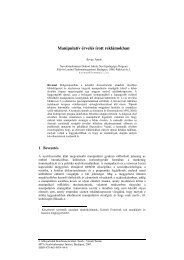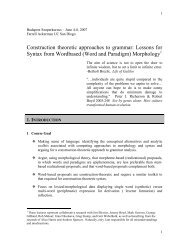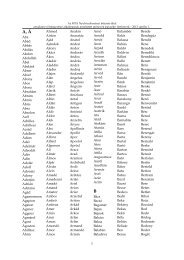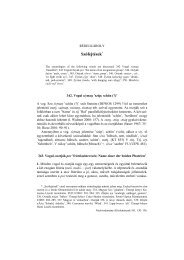Nyelvtudományi közlemények 91. kötet (1990)
Nyelvtudományi közlemények 91. kötet (1990)
Nyelvtudományi közlemények 91. kötet (1990)
Erfolgreiche ePaper selbst erstellen
Machen Sie aus Ihren PDF Publikationen ein blätterbares Flipbook mit unserer einzigartigen Google optimierten e-Paper Software.
142 ANDRÁS KORNAI<br />
Conditions on well-formedness are frequently "enforced" by a conspiracy<br />
of rules which modify the offending combinations that arise in the course<br />
of the derivations (cf. e.g. Kisseberth 1970). The lack of geminate onsets in<br />
Hungarian appears to be a purely "static" well-formedness condition in<br />
the sense that no rules are necessary to enforce it: as there are no singleconsonant<br />
prefixes in Hungarian, the disallowed cominations simply do not<br />
arise. This example shows that even static conditions can have priority over<br />
the generalization expressed in (2).<br />
Fourth, dynamic well-formedness conditions or, equivalently, the<br />
phonological rules enforcing these can also distort the picture. For instance,<br />
the onsets sv, szv, kv, cv, and tv (as in svéd 'Swedish', szvit 'suite', kvarc<br />
'quartz', cvikker 'pince-nez', and tviszt 'twist') have no coda counterparts,<br />
since devoicing would turn these into/5, fsz, Д, /c, and ft. Similarly, the onsets<br />
szt, szc, scs, st, and pn (as in sztár 'movie star', szcenárió 'screenplay,<br />
scsi 'kind of soup', steril 'sterile', and pneumatikus 'pneumatic') correspond<br />
to codas that trigger rules of affrication and assimilation.<br />
Taking all these factors into consideration, there remain only six "1"<br />
entries in (6), and half of these are caused by onsets appearing in a single<br />
word [zlotyi 'Polish currency', hradzsin 'castle in Prague', gvárdián 'Father<br />
Superior'). The rest might be attributed to accidental gaps in the coda<br />
system [blúz 'shirt', smaragd 'emerald'), with the exception of *szp codas<br />
(cf. pszichológia 'psychology'), the absence of which appears to be systematic<br />
in the light of (3), given the coda psz (e.g. in gipsz 'gypsum').<br />
Word initial szp is also possible (szpíker 'announcer'), and similarly<br />
with ksz we have kszilofón 'marimba', maszk 'mask', szkiff 'skiff' and keksz<br />
'biscuit'. Aside from a couple of proper names (Szakcs and Recsk), and some<br />
inflected forms, the pairs listed above, and the type liszt 'flour' vs. sztár<br />
'movie star' constitute the only counterexamples to (1) and (3) in Hungarian.<br />
Selkirk (1984) attempts to deal with the same problem in English by<br />
treating |sp, st, sk| clusters as affricates, but Clements (pc) notes that<br />
(i) these clusters do not pattern with "true' affricates (*crV, jrV, as<br />
opposed to sprV)<br />
(ii) unlike true affricates, these clusters are easily broken up by speech<br />
errors<br />
(iii) Selkirk's theory leaves the lack of syllable-final<br />
contrasts unexplained.<br />
VC<br />
VCC<br />
/\ vs. I I<br />
s p<br />
sp<br />
Nyelvtudományi Közlemények <strong>91.</strong> <strong>1990</strong>.


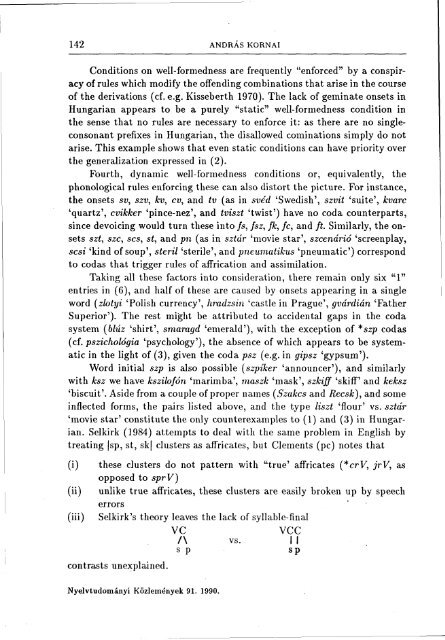
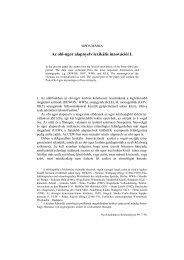
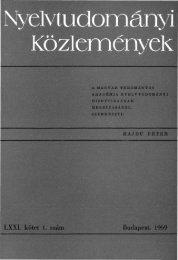
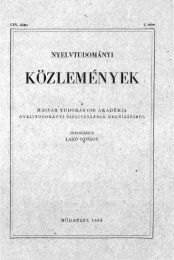
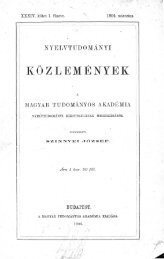
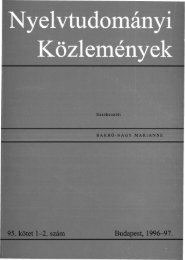
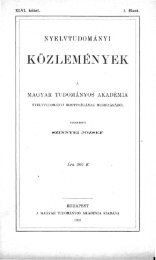
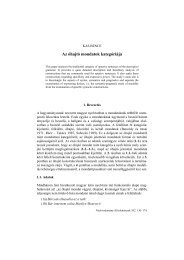
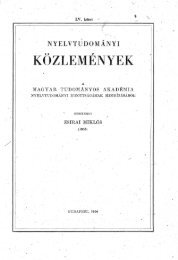
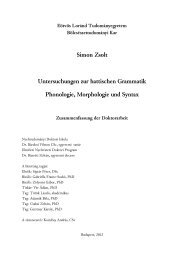
![Gósy Mária: A [p, t, k] mássalhangzók zöngekezdési ideje Bevezetés ...](https://img.yumpu.com/15682849/1/190x245/gosy-maria-a-p-t-k-massalhangzok-zongekezdesi-ideje-bevezetes-.jpg?quality=85)
